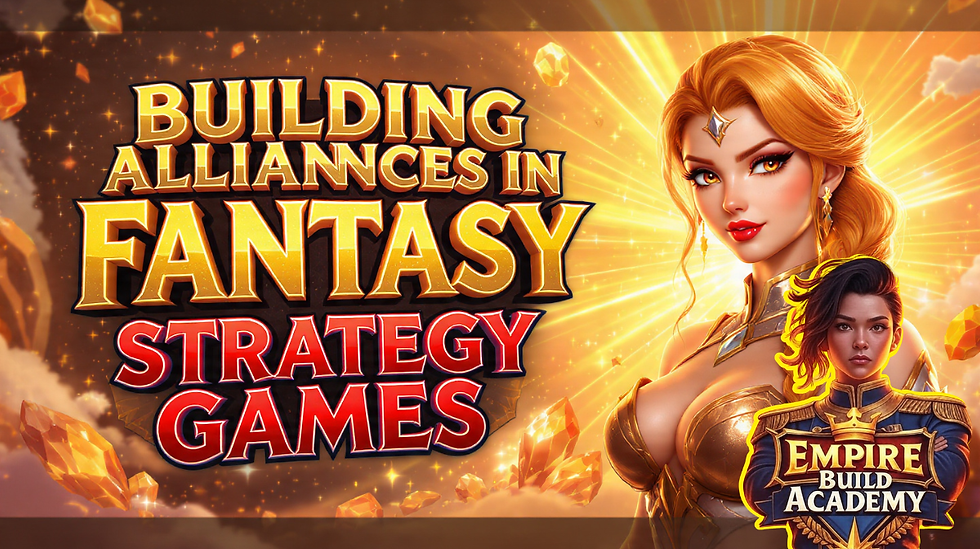Building Alliances in Fantasy Strategy Games
- Favian the Wise Man

- Oct 20, 2025
- 3 min read
In the world of fantasy strategy games, success often hinges on more than just individual skill or powerful armies. Building alliances is a crucial element that can turn the tide of battle and secure your dominance. Whether you are defending your kingdom or expanding your territory, forming strong partnerships with other players can provide strategic advantages that are impossible to achieve alone.
The Importance of Alliances in Fantasy Strategy
Alliances in fantasy strategy games serve multiple purposes. They allow players to pool resources, share intelligence, and coordinate attacks or defenses. This cooperation can lead to faster growth, better protection, and more effective conquest of enemy territories.
For example, in many games, players can send reinforcements to allies under attack or request help during critical moments. This mutual support system creates a dynamic where teamwork is rewarded, and solo players may find themselves at a disadvantage.
Key benefits of alliances include:
Resource sharing: Allies can trade or gift resources to help each other grow.
Joint attacks: Coordinated strikes can overwhelm opponents.
Defense support: Reinforcements from allies can save a city or fortress.
Information exchange: Sharing intelligence about enemy movements improves strategic planning.
By understanding these benefits, players can better appreciate why alliances are often the backbone of successful gameplay in fantasy strategy titles.

How to Build Strong Alliances in Fantasy Strategy Games
Building a strong alliance requires more than just adding friends to your list. It involves trust, communication, and strategic planning. Here are some practical steps to create and maintain powerful alliances:
Choose the right allies: Look for players who are active, reliable, and have complementary strengths. Avoid those who frequently go inactive or cause conflicts.
Communicate regularly: Use in-game chat, voice apps, or forums to coordinate plans and share updates.
Set clear goals: Agree on common objectives such as territory expansion, resource gathering, or defense strategies.
Support each other: Send reinforcements, share resources, and help with building or upgrading structures.
Resolve conflicts diplomatically: Disagreements are inevitable, but handling them calmly keeps the alliance strong.
By following these guidelines, alliances can become a formidable force that enhances every member’s gameplay experience.

Is Game of Thrones: Conquest free?
Many players wonder if popular fantasy strategy games like Game of Thrones: Conquest require an upfront purchase or subscription. The good news is that Game of Thrones: Conquest is free to download and play. However, like many free-to-play games, it offers in-app purchases that can speed up progress or provide cosmetic enhancements.
This model allows players to enjoy the core gameplay without spending money, but investing in certain items or boosts can give competitive advantages. It’s important to balance spending with strategic skill to avoid becoming overly reliant on paid features.
For those interested in exploring this game, you can find more information and download it here: game of thrones conquest.
Strategies for Maintaining Long-Term Alliances
Forming an alliance is just the beginning. Maintaining it over time requires effort and adaptability. Here are some strategies to keep your alliance strong and effective:
Regularly review alliance goals: As the game evolves, so should your objectives. Adapt to new challenges and opportunities.
Celebrate victories together: Recognising achievements boosts morale and loyalty.
Encourage participation: Motivate members to stay active through events, rewards, or leadership roles.
Manage leadership roles: Assign responsibilities like diplomacy, resource management, or military command to trusted members.
Handle betrayals carefully: If a member acts against the alliance, address the issue promptly to prevent damage.
By fostering a positive and organised alliance culture, players can enjoy a more rewarding and successful gaming experience.

Leveraging Alliances for Competitive Advantage
In competitive fantasy strategy games, alliances can be the difference between victory and defeat. Here are some actionable recommendations to leverage alliances effectively:
Coordinate timing: Plan attacks or defenses to coincide with allies’ actions for maximum impact.
Share scouting information: Knowing enemy positions and movements helps avoid ambushes and plan counterattacks.
Pool resources for upgrades: Combine efforts to build powerful structures or units faster.
Use diplomacy: Negotiate with other alliances to form temporary truces or joint operations.
Train together: Share tips and strategies to improve overall alliance strength.
By using these tactics, alliances become more than just groups of players - they transform into strategic units capable of dominating the game world.
Building alliances in fantasy strategy games is a rewarding challenge that enhances gameplay and fosters community. Whether you are new to the genre or a seasoned player, investing time in creating and nurturing alliances will open new paths to success and enjoyment. Embrace teamwork, communicate clearly, and strategise wisely to conquer your fantasy realm.





Comments